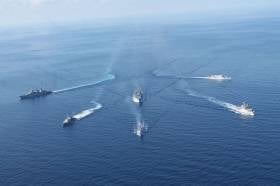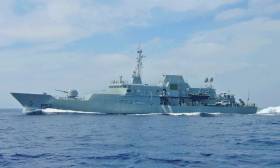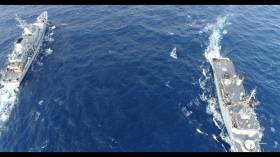Displaying items by tag: Operation Sophia
L.É. Niamh Arrives Home in Time for Christmas Having Carried Out Historic Naval First Operation
#LENiamhHomecoming - L.É. Niamh returned to Cork Harbour anchorage overnight just in time for Christmas, having carried out a new historic first for the Irish Naval Service in the participation of Operation Sophia, writes Jehan Ashmore
Afloat continued tracking the OPV80 'Róisín' class patrol ship as of this mid-morning, L.É. Niamh weighed anchor in lower Cork Harbour to make the short passage to Haulbowline Naval Base and under the escort of tug, Gerry O'Sullivan. On board were a 55-strong crew planning to wear Santa hats under the command Lt Cdr Stuart Armstrong. Awaiting them were families and loved ones looking forward to sharing the festive period.
As previously reported on Afloat, the OPV80 class L.E. Niamh had departed Cork in October for the three-month deployment. This involved working as part of European Naval Force Mediterranean - Eunavfor Med Operation Sophia that consisted of a six-strong naval flotilla task force off the coast of Libya to neutralise people-smuggling operations.
Operation Sophia saw the interception of boats used by the smugglers from the Libyan coast and returning the migrants to north Africa.
In late November, the Eunavfor flotilla met to conduct exercises and crew exchanges taking advantage of tactical situations. During this rendez-vous, they kept performing operational tasks, obtaining information and controlling maritime traffic.
Last week, the Spanish auxiliary supplies ship Cantabria moored in Taranto, an Italian Naval base. On board a command change ceremony took place of Operation Sophia Task Force that saw the transfer from the Spanish to the duty of Force Commander of the Italian Navy.
Afloat also last week tracked down L.É. Niamh when south of Sicily, as the OPV had departed from the Ionian Sea port of Augusta on the Italian mainland.
LÉ Niamh Departs On New Med Mission To Intercept Migrant Boats
#Navy - The LÉ Niamh is headed for the Mediterranean today (Friday 6 October) for the Naval Service’s first ever role in an operation directly targeting human traffickers.
As BreakingNews.ie reports, the EU mission Operation Sophia aims to intercept boats used by people-smugglers from the Libyan coast and return migrants to North Africa.
However, the pivot away from rescue missions has been criticised by Sinn Féin’s defence spokesperson Aengus O'Snodaigh, who cites “appalling” conditions for returned migrants in Libyan detention centres.
LÉ Eithne Set to Return Home As LÉ William Butler Yeats Heads for Mediterranean Rescue Role
#navy - Irish Naval Service flagship LÉ Eithne is due to arrive back in Cork Harbour this weekend while a fleetmate is already in the Mediterranean to continue humanitarian duties by saving lives at sea, writes Jehan Ashmore
LÉ Eithne is due to enter Cork Harbour on Saturday and directly taking her place is LÉ William Butler Yeats which had departed Irish shores this day last week. The OPV90 vessel is the newest of three sisters out of overall an eight-strong fleet. The newcomer will relieve the crew of LÉ Eithne by continuing the mission to rescue refugees and migrants from overcrowded unseaworthy craft and barges.
The deployment of LÉ William Butler Yeats to the Mediterranean off the Afican coast will be under the current Operation Pontus. The OPV90 class vessel had made a rendezvous with LÉ Eithne on Monday this week while east off Gibraltar. The hand-over of naval vessels will see duties continued to be carried out off the coast of Libya.
In mid-July the Dáil had sanctioned the Defence Forces to join Operation Sophia, which became the Naval Service’s first ever multi-national naval mission. The operation forms part of a wider EU operation in which measures are designed to be more active in efforts to prevent people smugglers before migrants are put out to sea on dangerous boats.
For over the past three years the role of search and rescue (SAR) operations carried out by the Naval Service in the Mediterranean had totalled in rescuing more than 16,800 migrants.
Commenting on this achievement and the decision to join Operation Sophia, the Minister with Responsibility for Defence, Mr. Paul Kehoe, T.D commented “The Government is extremely proud of the manner in which the Naval Service has performed its role in the Mediterranean.”































































